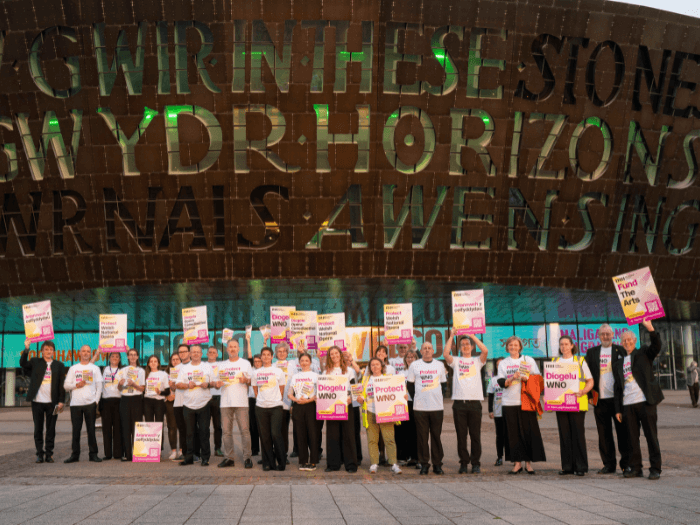Musicians in the Welsh National Opera took Action Short of Strike outside the Wales Millenium Centre in Cardiff Bay. Image credit: Adam Grasson/PA Media Assignments.
Musicians in the Welsh National Opera (WNO) orchestra are calling on management, Arts Council of Wales and Arts Council England to keep WNO as a full-time company, stop the proposed 15% pay cut and agree a sustainable funding package to secure WNO’s future including touring.
It is the first round of Action Short of Strike since members voted yes to potential industrial action in July.
Over 11,000 people have signed a petition started by musicians in the orchestra to protect WNO.
Sign the petition now
Have you already signed the petition?
MU members’ campaign to protect WNO has been backed by members of the Senedd and TUC Cymru/Wales TUC.
Welsh and UK Governments must also play their parts
At the same time, the MU is continuing to lobby the Welsh and UK Governments to intervene given the likely impact of WNO management’s proposals on the musical landscape and economy of Wales.
It comes as the Welsh Government has recently provided an additional £1.5m in funding to support arts organisations in Wales.
The MU is urging Arts Council of Wales and Welsh National Opera to ensure that the additional funding is used to safeguard full-time, employed, unionised jobs currently at risk in the WNO orchestra and chorus.
Protecting opportunities to see live opera in Wales and South West England
MU General Secretary, Naomi Pohl, said: “We welcome the acknowledgement of the funding crisis facing Welsh arts organisations and the need for further support to protect musicians’ jobs in Wales. It is encouraging that the voices of our members and all those who support WNO are being heard.
There are very few opportunities to see live opera in Wales and South West England and the WNO management’s proposals will mean some areas have no provision at all.
“Our members don’t take industrial action of any kind lightly. They are motivated by the inevitable impact of management’s proposals on Welsh culture and audiences and the loss of opportunity for freelance musicians, as well as the personal impact of the proposed reduction in their hours and pay.
“There are very few opportunities to see live opera in Wales and South West England and the WNO management’s proposals will mean some areas have no provision at all. Alongside the proposed closure of the Welsh College of Music and Drama’s junior department, and the ongoing closure of St David’s Hall, musical activity in Wales has seriously diminished.
“We hope the seriousness of the situation is evident to the Welsh Government and that they will step in if the Arts Councils can’t or won’t.”

Image credit: Adam Grasson/PA Media Assignments.
MU members won’t sit by while musical opportunities vanish
MU Regional Organiser for Wales and South West England, Andy Warnock, said: “WNO has long been funded by a combination of Arts Council England and Arts Council of Wales and it serves parts of the UK that other opera companies don’t reach.
“Arts Council England made the first and largest cut and this has sadly meant a reduction in WNO’s touring plans, as well as the proposed changes to pay and conditions. Given the objectives of both the Welsh and UK Governments and Arts Councils to ensure equal access to the arts across the UK, in all towns and communities, this is a massive backwards step.
“MU members won’t sit by while musical opportunities for audiences, musicians and young people vanish. There is still time for the Wales and UK Governments to step in and provide the additional support that's needed to protect WNO as a national cultural asset and we hope they will do so.
“We are pleased the orchestra has taken the important decision to take industrial action today and we’ll be with them every step of the way.”
These are highly skilled jobs and should be paid as such
MU National Organiser for Orchestras, Jo Laverty, said: “We simply do not accept yet another opera orchestra being forced into part-time, less secure employment.
“Whilst the recent emergency funding package from Welsh Government to Arts Council Wales is welcome, it is not at all clear whether this will be prioritised in terms of supporting stable and secure employment for our members, as we are lobbying for it to be.
“These are highly skilled jobs but they are not paid as such. Taking members’ salaries back to where they were five years ago means members are facing really tough financial decisions about whether they can afford to stay with the company.
“Given the landscape of ever reducing opportunities for musicians to make a living in Wales, some will be forced to leave the country altogether.”